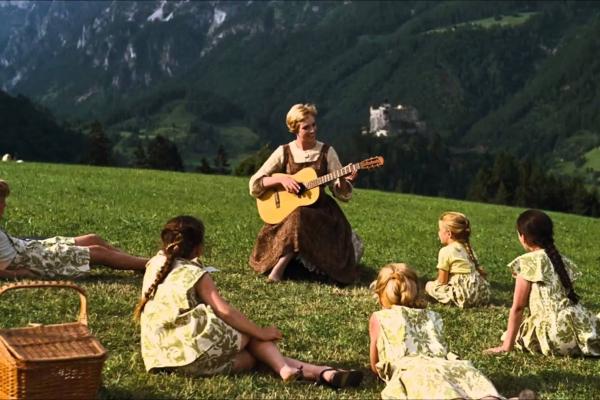IT’S THE 50TH anniversary of The Sound of Music. I never thought I’d write about it here, but someone recently offered me the kind of gentle admonishment that Maria might have given to the von Trapp children. Maria is usually right, and my friend is too. One of the wisest film critics I know, a man dedicated to contemplation and activism and who doesn’t shy away from the more challenging edges of cinema, still considers it his favorite film.
Don’t get me wrong— it’s not the greatest movie he’s ever seen (that’s usually an entirely different category to “favorite”). But The Sound of Music did something unique for my friend—it showed him that there was a bigger world out there. My friend was suffering constant night terrors. When The Sound of Music finally showed up in his town, it was the first film ever to be approved by the local religious authorities. He felt safe to watch it (as did many other townsfolk— it played at their local theater for six years without a break); it became a bath for his soul. The scale, the energy, the sheer heart seemed to leap off the screen. The night terrors stopped, and never came back. He says he’s seen it nearly 60 times in the last 50 years. Lest we forget, the story is one of hope trumping almost unimaginable odds.
There’s a reason The Sound of Music has endured, and it’s not sentiment alone. It also did much to shape cultural perceptions of the vowed religious life. Maria isn’t exactly the most authentic cinematic depiction of the institutional experience, but nor is she the most unrealistic portrayal of what happens when a desire for service is given space to breathe. She has cinematic company in the form of Kathleen Freeman’s hilarious Mother Superior with a nasty edge in The Blues Brothers, Moira Kelly’s impassioned Dorothy Day in Entertaining Angels, and most recently in television (or whatever Amazon Originals are) by Kathryn Hahn’s Rabbi Raquel in Transparent.
Rabbi Raquel may be the most fully realized TV or movie clergy character, at least in the way she acknowledges the particular gifts and challenges of being called out to offer leadership while also living among the community. When are you off work? How do you maintain a relational life when hundreds of people expect you to be not only their spiritual adviser but also their surrogate parent or teacher? Transparent is warm and funny about this where The Sound of Music is prim and proper. But what unites them is that each wants its female religious figures to lead.

Got something to say about what you're reading? We value your feedback!
